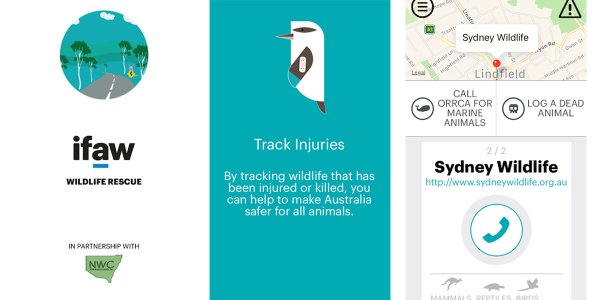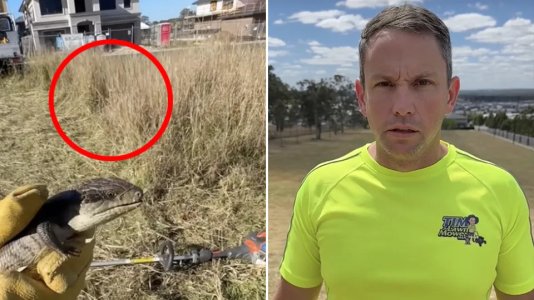Gardener’s close call: The ‘scary’ mistake in overgrown grass sparks wildlife warning
As the summer season approaches, gardening becomes a particularly fulfilling activity, complemented by the ideal weather that brings forth a lush and vibrant garden.
Yet, while caring for our green spaces is essential for a tidy home and garden, it comes with risks, as one gardener recently experienced.
This incident highlighted wildlife concerns for spring lawn care, as this man had a close encounter with a blue-tongue lizard.
‘Tim the Lawnmower Man’, a Sydney-based tradie, shared a video on Monday where he narrowly avoided a blue-tongue lizard while trimming tall grass in an overgrown vacant lot with a whipper snipper.
In the video, Tim exclaimed, ‘What wildlife is in overgrown lawns?’
He recounted the near miss: ‘This dude is so lucky. I just literally trimmed over the top of him, saw him, and he scared the absolute bejesus out of me. He's going to live to see another day. Let’s find somewhere safe for him.’
Tim then gently moved the reptile to a safer location, away from the overgrown grass.
The video quickly garnered over 5,000 views within hours, serving as a strong reminder for individuals preparing for lawn maintenance activities.
Species Manager Sam Chatfield from Wildlife Arc on the NSW Central Coast commended Tim’s considerate actions, saying it was ‘lovely’ to see the gardener’s caring gesture toward the blue-tongue lizard.
‘He picked it up and then moved it somewhere into a safer area, so it's good to see compassion for our native wildlife,’ she said.
Chatfield stressed the unfortunate frequency of injuries inflicted upon Australian wildlife due to machinery.
She provided some examples, noting incidents involving possums and other mammals harmed by tools like whipper snippers or hedge cutters.
‘We do sometimes see mammals like possums that have been injured by whipper snippers or hedge cutters,’ she shared.
‘But we do get quite a few reptiles because they're more likely to rely upon behavioural modification, and their colouration to try and hide rather than fleeing the area. They're likely to remain still, and that's why they get hit.’
A gardener found a blue-tongue lizard while trimming in overgrown grass. Video source: TikTok/@timthelawnmowerman
Furthermore, Chatfield underscored the importance of inspecting grass or hedges before undertaking any work.
She added that maintaining awareness and ‘making yourself known’ is crucial to warn wildlife about potential disturbances.
‘These animals didn't want to interact with us at all,’ she said.
‘We're big, we're scary and we're predators, so they want the opportunity to actually flee. So if we give them that advance notice before we start cutting anything or mowing anything, they will leave most of the time.’
Here are her suggestions:
In case a mower harms an animal, Chatfield highlighted the importance of seeking assistance promptly.
‘Accidents happen, that's fine,’ she added, ‘The next crucial step is to get help for the animal.’
She suggested using IFAW, a free wildlife rescue app. This app is available for both Apple and Android devices.
‘It will tell you who your local wildlife rescue organisation is based on where you are at the time,’ she added. ‘Otherwise, you can Google through your local group.’


Members, what are your thoughts on this story? Have you experienced close calls while mowing or gardening, unintentionally causing harm to wild animals? Share your stories below!
Yet, while caring for our green spaces is essential for a tidy home and garden, it comes with risks, as one gardener recently experienced.
This incident highlighted wildlife concerns for spring lawn care, as this man had a close encounter with a blue-tongue lizard.
‘Tim the Lawnmower Man’, a Sydney-based tradie, shared a video on Monday where he narrowly avoided a blue-tongue lizard while trimming tall grass in an overgrown vacant lot with a whipper snipper.
In the video, Tim exclaimed, ‘What wildlife is in overgrown lawns?’
He recounted the near miss: ‘This dude is so lucky. I just literally trimmed over the top of him, saw him, and he scared the absolute bejesus out of me. He's going to live to see another day. Let’s find somewhere safe for him.’
Tim then gently moved the reptile to a safer location, away from the overgrown grass.
The video quickly garnered over 5,000 views within hours, serving as a strong reminder for individuals preparing for lawn maintenance activities.
Species Manager Sam Chatfield from Wildlife Arc on the NSW Central Coast commended Tim’s considerate actions, saying it was ‘lovely’ to see the gardener’s caring gesture toward the blue-tongue lizard.
‘He picked it up and then moved it somewhere into a safer area, so it's good to see compassion for our native wildlife,’ she said.
Chatfield stressed the unfortunate frequency of injuries inflicted upon Australian wildlife due to machinery.
She provided some examples, noting incidents involving possums and other mammals harmed by tools like whipper snippers or hedge cutters.
‘We do sometimes see mammals like possums that have been injured by whipper snippers or hedge cutters,’ she shared.
‘But we do get quite a few reptiles because they're more likely to rely upon behavioural modification, and their colouration to try and hide rather than fleeing the area. They're likely to remain still, and that's why they get hit.’
A gardener found a blue-tongue lizard while trimming in overgrown grass. Video source: TikTok/@timthelawnmowerman
Furthermore, Chatfield underscored the importance of inspecting grass or hedges before undertaking any work.
She added that maintaining awareness and ‘making yourself known’ is crucial to warn wildlife about potential disturbances.
‘These animals didn't want to interact with us at all,’ she said.
‘We're big, we're scary and we're predators, so they want the opportunity to actually flee. So if we give them that advance notice before we start cutting anything or mowing anything, they will leave most of the time.’
Here are her suggestions:
- Make noise to encourage wildlife to move out of long grass or hedges.
- Wear boots and gloves—‘You don't ever want to reach in somewhere with bare hands.’
In case a mower harms an animal, Chatfield highlighted the importance of seeking assistance promptly.
‘Accidents happen, that's fine,’ she added, ‘The next crucial step is to get help for the animal.’
She suggested using IFAW, a free wildlife rescue app. This app is available for both Apple and Android devices.
‘It will tell you who your local wildlife rescue organisation is based on where you are at the time,’ she added. ‘Otherwise, you can Google through your local group.’

The app guides users on aiding sick or injured Australian wildlife by providing contact information and instructions until professional rescuers can take over. Image source: IFAW/Google Play
Key Takeaways
- A Sydney-based gardener nearly hit a blue-tongue lizard while trimming tall grass, prompting a warning from wildlife experts.
- The gardener’s video, which shows him moving the reptile to a safe spot, has amassed over 5,000 views.
- Wildlife Expert Sam Chatfield noted that it’s common to see injuries among Australian wildlife due to gardening tools, especially among reptiles who often try to hide rather than flee.
- She advises checking grass or hedges before carrying out any work, and if an animal is injured, to seek help immediately through resources like the IFAW, a free wildlife rescue app.









